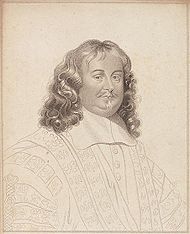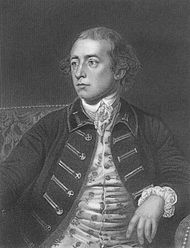- Lord High Steward
-
 Lord High Steward Edward Hyde, 1. Earl of Clarendon
Lord High Steward Edward Hyde, 1. Earl of Clarendon
Der Lord High Steward von England - nicht zu verwechseln mit dem High Steward, einer Gerichtsfunktion - ist der Führende der Great Officers of State. Unter ihm stehen der Lord High Chancellor (Lordkanzler) und der Lord High Treasurer (Lordschatzmeister).
Der Amtsinhaber hatte vornehmlich repräsentative Aufgaben wahrzunehmen wie den Vorsitz bei der Krönung britischer Monarchen und Erhebungen in den Adelsstand. Er nahm aber auch eine wichtige judikative Funktion wahr: den Vorsitz bei Prozessen gegen Mitglieder des Adels. Obwohl zunächst ohne politische Funktion, nahm die Bedeutung dieser Position im Laufe der Zeit so zu, dass ihr Inhaber schließlich einer der mächtigsten Männer des Königreichs war.
Der erste Lord High Steward scheint Robert de Beaumont, 2. Earl of Leicester, Sohn von Robert de Beaumont, 1. Earl of Leicester, gewesen zu sein. Seitdem war das Amt mit dem Adelstitel Earl of Leicester verbunden, bis Henry Bolingbroke, Earl of Leicester und Duke of Lancaster als Heinrich IV. 1399 selbst König von England wurde. Er machte seinen zweiten Sohn Thomas of Lancaster, 1. Duke of Clarence zum Lord High Steward. Nach dessen Tod 1421 blieb das Amt unbesetzt, und meist übernahmen der Lord Chancellor oder andere Mitglieder des hohen Adels die entsprechenden Aufgaben.
Um einen Adligen aufgrund von Straftaten zu verurteilen, musste ihm im Oberhaus der Prozess gemacht werden. Dazu wurde ein Anwesender zum Lord High Steward ernannt, der das Verfahren anschließend leitete. Strafverfahren gegen Adlige im Oberhaus wurden erst 1948 abgeschafft.
Der Titel sollte nicht mit dem des Lord Steward (Lord Steward of the Household) verwechselt werden.
Lords High Steward von England 1154–1421
- Robert de Beaumont, 2. Earl of Leicester 1154–1168
- Robert de Beaumont, 3. Earl of Leicester 1168–1190
- Robert de Beaumont, 4. Earl of Leicester 1190–1204
- Simon de Montfort, 5. Earl of Leicester 1206–1218
- Simon de Montfort, 6. Earl of Leicester 1218–1265
- Edmund Crouchback, 1. Earl of Lancaster 1265–1296
- Thomas Plantagenet, 2. Earl of Lancaster 1296–1322
- Henry Plantagenet, 3. Earl of Lancaster 1324–1345
- Henry of Grosmont, 1. Duke of Lancaster 1345–1361
- John of Gaunt, 1. Duke of Lancaster 1362–1399
- Henry of Bolingbroke, 2. Duke of Lancaster 1399
- Thomas of Lancaster, 1. Duke of Clarence 1399–1421
Lords High Steward von England bei Krönungen 1422 bis heute
- unvollständig
- Edward Stafford, 3. Duke of Buckingham 1509 Heinrich VIII.
- John Russell, 1. Earl von Bedford 1547 Eduard VI.
- Edward Stanley, 3. Earl of Derby 1553 Johanna
- 1559 Elisabeth I.
- 1603 Jakob I.
- 1626 Karl I.
- James Butler, 1. Duke of Ormonde 1661 Karl II.
- James Butler, 1. Duke of Ormonde 1685 Jakob II.
- William Cavendish, 1. Duke of Devonshire 1689 Wilhelm III.
- William Cavendish, 1. Duke of Devonshire 1702 Anne
- Charles Fitzroy, 2. Duke of Grafton 1714 Georg I.
- Lionel Cranfield Sackville, 1. Duke of Dorset 1727 Georg II.
- William Talbot, 1. Earl Talbot 1761 Georg III.
- Henry William Paget, 1. Marquess of Anglesey 1821 Georg IV.
- Alexander Douglas-Hamilton, 10. Duke of Hamilton 1831 Wilhelm IV.
- Alexander Douglas-Hamilton, 10. Duke of Hamilton 1838 Victoria
- Charles Spencer-Churchill, 9. Duke of Marlborough 1902 Eduard VII.
- Henry George Percy, 7. Duke of Northumberland 1911 Georg V.
- James Gascoyne-Cecil, 4. Marquess of Salisbury 1937 Georg VI.
- Andrew Cunningham, 1. Viscount Cunningham of Hyndhope 1953 Elisabeth II.
Lords High Steward von England bei Prozessen gegen Mitglieder des Adels 1422 bis heute
- unvollständig bis 1660
- Henry Stafford, 2. Duke of Buckingham im Prozess gegen
- John de Vere, 13. Earl of Oxford im Prozess gegen
- Thomas Howard, 2. Duke of Norfolk im Prozess gegen
- Thomas Howard, 3. Duke of Norfolk im Prozess gegen
- Anne Boleyn 1536
- Thomas Audley, 1. Baron Audley von Walden im Prozess gegen
- Henry Pole, Lord Montagu 1538
- Henry Courtenay, 1. Marquess of Exeter 1538
- Thomas Fiennes, 9. Baron Dacre 1541
- William Parr, 1. Marquess of Northampton im Prozess gegen
- Lord Wentworth 1559
- George Talbot, 6. Earl of Shrewsbury im Prozess gegen
- Henry Stanley, 4. Earl of Derby im Prozess gegen
- Thomas Sackville, 1. Earl of Dorset im Prozess gegen
- Thomas Howard, 21. Earl of Arundel im Prozess gegen
- Edward Hyde, 1. Earl of Clarendon (Lord Chancellor) im Prozess gegen
- Thomas Park, 15. Baron Morley 1666
- Heneage Finch, 1. Earl of Nottingham (Lord Chancellor) im Prozess gegen
- Charles Cornwallis, 3. Baron Cornwallis 1676
- Philip Herbert, 7. Earl of Pembroke
- Thomas Osborne, Earl of Danby 1679
- William Herbert, 1. Marquess of Powis 1679
- William Howard, 1. Viscount Stafford 1679
- Henry Arundell, 3. Baron Arundell of Wardour 1679
- William Petre, 4. Baron Petre 1679
- John Belasyse, 1. Baron Belasyse 1679
- William Howard, 1. Viscount Stafford 1680
- George Jeffreys, 1. Baron Jeffreys (Lord Chancellor) im Prozess gegen
- Henry Booth, 1. Earl of Warrington 1685
- Thomas Osborne, Marquess of Carmarthen (Lord President of the Council) im Prozess gegen
- Charles Mohun, 4. Baron Mohun 1699
- John Somers, 1. Baron Somers (Lord Chancellor) im Prozess gegen
- Edward Rich, 6. Earl of Warwick 1699
- Charles Mohun, 4. Baron Mohun 1699
- William Cowper, 1. Earl Cowper (Lord Chancellor) im Prozess gegen
- James Radclyffe, 3. Earl of Derwentwater 1716
- William Widdrington, 4. Baron Widdrington 1716
- William Maxwell, 5. Earl of Nithsdale 1716
- Robert Dalzell, 5. Earl of Carnwath 1716
- William Gordon, 6. Viscount Kenmure 1716
- William Murray, 2. Lord Nairne 1716
- George Seton, 5. Earl of Winton 1716
- Robert Harley, 1. Earl of Oxford and Mortimer 1717
- Peter King, 1. Baron King (Lord Chancellor) im Prozess gegen
- Thomas Parker, 1. Earl of Macclesfield 1725
- Philip Yorke, 1. Earl of Hardwicke (Lord Chancellor) im Prozess gegen
- William Boyd, 4. Earl of Kilmarnock 1746
- George Mackenzie, 3. Earl of Cromartie 1746
- Arthur Elphinstone, 6. Lord Balmerinoch 1746
- Simon Fraser, 11. Lord Lovat 1747
- Robert Henley, 1. Earl of Northington (Lord Privy Seal) im Prozess gegen
- Lawrence Shirley 1760
- Elizabeth Chudleigh, Duchess of Kingston 1765
- Edward Thurlow, 1. Baron Thurlow (Lord Chancellor) im Prozess gegen
- Warren Hastings 1788-1793
- Alexander Wedderburn, 1. Earl of Rosslyn (Lord Chancellor) im Prozess gegen
- Warren Hastings 1793-1795
- Thomas Erskine, 1. Baron Erskine (Lord Chancellor) im Prozess gegen
- Thomas Denman, 1. Baron Denman (Lord Chief Justice) im Prozess gegen
- unvollständig nach 1841
- Hardinge Giffard, 1. Earl of Halsbury (Lord Chancellor) im Prozess gegen
- Douglas Hogg, 1. Viscount Hailsham (Lord Chancellor) im Prozess gegen
- Edward Russell, 26. Baron de Clifford, 1935
Der Prozess gegen Lord de Clifford wegen fahrlässiger Tötung im Straßenverkehr war der letzte, der im Oberhaus verhandelt wurde.
Lord High Steward | Lord High Chancellor | Lord High Treasurer | Lord President of the Council | Lord Keeper of the Privy Seal | Lord Great Chamberlain | Lord High Constable | Earl Marshal | Lord High Admiral
Wikimedia Foundation.
Schlagen Sie auch in anderen Wörterbüchern nach:
Lord high steward — Steward Stew ard, n. [OE. stiward, AS. st[=i]weard, stigweard, literally, a sty ward; stigu sty + weard warden, guardian, his first duty having been probably to attend to the domestic animals. [root]164. See {Sty} pen for swine, {Ward}.] 1. A man … The Collaborative International Dictionary of English
Lord High Steward — The position of Lord High Steward of England is the first of the Great Officers of State. The office has generally remained vacant since 1421, except at coronations and during the trials of peers in the House of Lords, when the Lord High Steward… … Wikipedia
lord high steward — ▪ English honorific office an honorific office that came to England with the Norman ducal household. From 1153 it was held by the earls of Leicester and then of Lancaster until it came into the hands of John of Gaunt (John of Gaunt, duke of … Universalium
lord high steward — noun : an English officer of state now appointed only for rare occasions (as a coronation or the trial of a peer) * * * Lord High Steward One of the great officers of state, and anciently the first officer of the crown in England • • • Main Entry … Useful english dictionary
lord high steward — In England, when a person was impeached, or when a peer was tried on indictment for treason or felony before the house of lords, one of the lords was appointed lord high steward, and acted as speaker pro tempore. The privilege of peerage in… … Black's law dictionary
lord high steward — In England, when a person was impeached, or when a peer was tried on indictment for treason or felony before the house of lords, one of the lords was appointed lord high steward, and acted as speaker pro tempore. The privilege of peerage in… … Black's law dictionary
Lord High Steward of Great Britain — Lord High Steward Edward Hyde, 1. Earl of Clarendon Der Lord High Steward von England nicht zu verwechseln mit dem High Steward, einer Gerichtsfunktion ist der Führende der Great Officers of State. Unter ihm stehen der Lord High Chancellor… … Deutsch Wikipedia
Lord High Steward of Ireland — The Lord High Steward of Ireland is a hereditary Great Officer of State in Ireland, sometimes known as the Hereditary Great Seneschal [In an inscription on a leaden coffin for the remains of Gilbert, 7th Earl of Shrewsbury (died May 1616), in the … Wikipedia
Lord High Steward d'Irlande — Comte de Shrewsbury Le titre de comte de Shrewsbury[1] est le titre le plus ancien encore actif de la pairie d Angleterre, étant donné que le titre de comte d Arundel est aujourd hui lié au titre de duc de Norfolk. Les premiers comtes furent… … Wikipédia en Français
Lord High Steward of Ireland — Der Lord High Steward of Ireland ist ein erbliches irisches Ehrenamt, das erstmals am 17. Juli 1446 von König Heinrich VI. an John Talbot, 1. Earl of Shrewsbury, verliehen wurde und bis heute im Besitz der Earls of Shrewsbury. ist. Gegenwärtiger… … Deutsch Wikipedia





